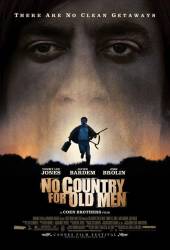Trivia: The scene in which Chigurh strangles the deputy was achieved with a metal chestplate on the deputy. It covered him from the middle of his chest to the jaw. Several different ones were made, each with the handcuffs in deeper.
Trivia: After burning and exploding a car, Anton Chigurh enters a pharmacy called Mike Zoss Pharmacy, to steal syringes, antibiotics and other stuff. The Coen brothers hung out at the real "Mike Zoss Drugs" located in a small shopping center call Texa Tonka, in St. Louis Park, a first ring suburb west of Minneapolis, Minnesota, when they were growing up and named it after him in the film as an homage. Mike Zoss Productions is the name of their production company (also named after the same man). "Mr. Zoss never asked us to leave," the brothers told Vanity Fair in 2011. "Out of gratitude we named our production company after him." The drugstore, founded in 1950, was later run by Mike's son Barry.
Trivia: While on location in Marfa, Texas, There Will Be Blood (2007) was the neighboring film production. While filming a wide shot of the landscape one day, directors Joel Coen and Ethan Coen had to halt shooting for the day as a gigantic dark cloud of smoke floated conspicuously into view. The source of this was found to be from Paul Thomas Anderson testing the pyrotechnics of an oil derrick set ablaze on the set of his film. The Coens had to resume filming the day afterward, when the smoke finally dissipated. Both this film and There Will Be Blood were the leading contenders at the Academy Awards a year and a half later.
Trivia: Joel Coen and Ethan Coen share the record of four Oscar nominations for a single person for the same film (in this case, shared by the two) with Orson Welles' four nominations for Citizen Kane (1941) and Warren Beatty's for Reds (1981). The Coens' four nominations are for Best Picture (as producers with Scott Rudin), Best Director, Best Adapted Screenplay, and Best Editing (under the pseudonym Roderick Jaynes). Welles was nominated both Best Picture (also as producer) and Best Director, as well as Best Original Screenplay (won, and shared with Herman J. Mankiewicz), and Best Actor. On the other hand, Beatty was nominated for Best Picture (also as producer), Best Director (won), Best Original Screenplay with Trevor Griffiths and Best Actor.
Suggested correction: Strictly speaking, Orson Welles was not nominated as producer of Citizen Kane. At the time, the nomination for Best Picture was for the studio (RKO), not the producer(s). In addition, Warren Beatty has actually achieved this feat twice, for Reds (as mentioned), as well as three years prior, when he received the same four nominations for Heaven Can Wait (1978).
Trivia: A pair of forensic psychiatrists watched 400 films dealing with psychopathic characters over a three-year period and concluded that Javier Bardem's portrayal of Anton Chigurh is the most accurate depiction of a psychopath they have seen.
Trivia: Josh Brolin filmed his audition tape for this film with the assistance of Quentin Tarantino and Robert Rodriguez, when all three individuals were working on Grindhouse.
Trivia: Josh Brolin would call various hotels in west Texas and have recorded conversations for the purpose of developing his accent for the film. He eventually based his accent on a man he met at a gas station.
Trivia: Josh Brolin had to put a chew toy in his pants in order to get the dog to chase him.
Trivia: The credited editor for this film, Roderick Jaynes, is a pseudonym for Joel and Ethan Coen, who have co-edited all of their movies since Blood Simple (1984), (in addition to co-directing and co-writing them). New York magazine reported that they devised the pseudonym when Guild membership rules would not allow two co-credited editors on the same film. Despite his non-existence, Jaynes was nominated for an Oscar for editing No Country for Old Men (2007) (as well as Fargo (1996)), but he has never won one. Joel Coen told New York magazine that if Jaynes had won the Oscar, the award presenter and not the Coens would have been the one authorized by the Academy to accept the award on "his" behalf. Joel Coen explained that the Academy doesn't "allow proxies to accept awards at the Academy Awards, ever since Marlon Brando and Sacheen Littlefeather."





